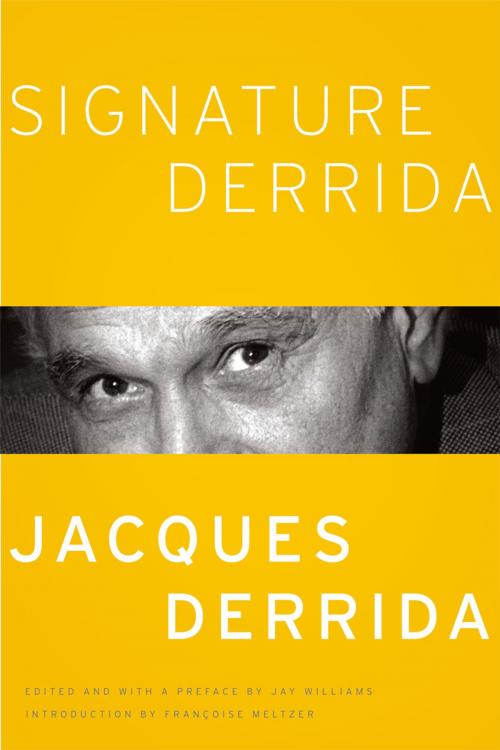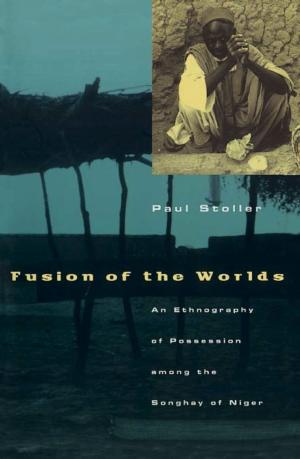Signature Derrida
Nonfiction, Religion & Spirituality, Philosophy, Modern, Fiction & Literature, Literary Theory & Criticism| Author: | Jacques Derrida, Jay Williams | ISBN: | 9780226924557 |
| Publisher: | University of Chicago Press | Publication: | April 11, 2013 |
| Imprint: | University of Chicago Press | Language: | English |
| Author: | Jacques Derrida, Jay Williams |
| ISBN: | 9780226924557 |
| Publisher: | University of Chicago Press |
| Publication: | April 11, 2013 |
| Imprint: | University of Chicago Press |
| Language: | English |
Throughout his long career, Jacques Derrida had a close, collaborative relationship with Critical Inquiry and its editors. He saved some of his most important essays for the journal, and he relished the ensuing arguments and polemics that stemmed from the responses to his writing that Critical Inquiry encouraged. Collecting the best of Derrida’s work that was published in the journal between 1980 and 2002, Signature Derrida provides a remarkable introduction to the philosopher and the evolution of his thought.
These essays define three significant “periods” in Derrida’s writing: his early, seemingly revolutionary phase; a middle stage, often autobiographical, that included spirited defense of his work; and his late period, when his persona as a public intellectual was prominent, and he wrote on topics such as animals and religion. The first period is represented by essays like “The Law of Genre,” in which Derrida produces a kind of phenomenological narratology. Another essay, “The Linguistic Circle of Geneva,” embodies the second, presenting deconstructionism at its best: Derrida shows that what was imagined to be an epistemological break in the study of linguistics was actually a repetition of earlier concepts. The final period of Derrida’s writing includes the essays “Of Spirit” and “The Animal That Therefore I Am (More to Follow),” and three eulogies to the intellectual legacies of Michel Foucault, Louis Marin, and Emmanuel Lévinas, in which Derrida uses the ideas of each thinker to push forward the implications of their theories.
With an introduction by Francoise Meltzer that provides an overview of the oeuvre of this singular philosopher, Signature Derrida is the most wide-ranging, and thus most representative, anthology of Derrida’s work to date.
Throughout his long career, Jacques Derrida had a close, collaborative relationship with Critical Inquiry and its editors. He saved some of his most important essays for the journal, and he relished the ensuing arguments and polemics that stemmed from the responses to his writing that Critical Inquiry encouraged. Collecting the best of Derrida’s work that was published in the journal between 1980 and 2002, Signature Derrida provides a remarkable introduction to the philosopher and the evolution of his thought.
These essays define three significant “periods” in Derrida’s writing: his early, seemingly revolutionary phase; a middle stage, often autobiographical, that included spirited defense of his work; and his late period, when his persona as a public intellectual was prominent, and he wrote on topics such as animals and religion. The first period is represented by essays like “The Law of Genre,” in which Derrida produces a kind of phenomenological narratology. Another essay, “The Linguistic Circle of Geneva,” embodies the second, presenting deconstructionism at its best: Derrida shows that what was imagined to be an epistemological break in the study of linguistics was actually a repetition of earlier concepts. The final period of Derrida’s writing includes the essays “Of Spirit” and “The Animal That Therefore I Am (More to Follow),” and three eulogies to the intellectual legacies of Michel Foucault, Louis Marin, and Emmanuel Lévinas, in which Derrida uses the ideas of each thinker to push forward the implications of their theories.
With an introduction by Francoise Meltzer that provides an overview of the oeuvre of this singular philosopher, Signature Derrida is the most wide-ranging, and thus most representative, anthology of Derrida’s work to date.















